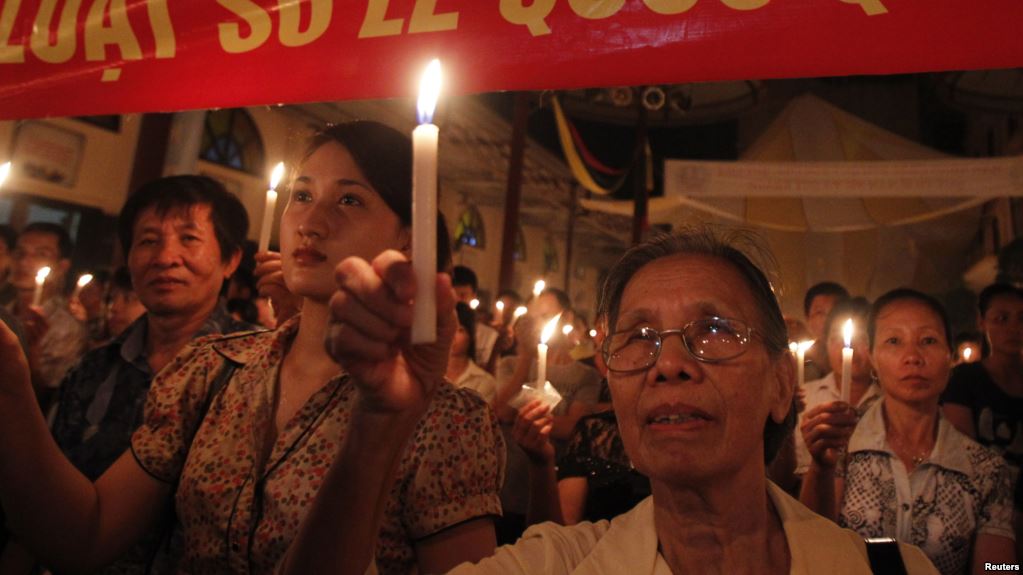


(Anti-corruption activist in Hanoi, Vietnam. Photo/Reuters)
Vietnamese scholars and experts hailed China's efforts in combating corruption, urging for cooperation between the two countries in this respect.
China has been carrying out a wide-ranging and far-reaching anti-corruption campaign, Vo Dai Luoc, the former director of the Institute of World Economics and Politics of the Vietnam Academy of Social Sciences, told Xinhua on Sunday.
The campaign covers various spheres including those as sensitive as the army and at all levels ranging from grassroots to high-level officials, the Vietnamese scholar said.
China's anti-corruption campaign targets not only "flies" (low-ranking corrupted officials), but also "tigers" (high-ranking corrupted officials), not only inside China but also outside the country, he said, referring to such campaigns as "Sky Net" and "Fox Hunt" which have caught more than 2,000 corrupted Chinese officials that had fled to dozens of other nations and regions.
"I am impressed by the decisive blows dealt to 'big tigers,'" Luoc said, adding that Vietnam should take vigorous measures similar to the Chinese ones to prevent and combat corruption in party organizations at the highest level as well as in the army.
China investigates cases of corruption very thoroughly, collecting persuasive evidences such as banknotes, gemstones and antiques, the scholar noted, saying that such evidences have facilitated the rapid, objective and transparent handling of corruption cases, which are really convincing.
The anti-corruption campaign has reinforced people's trust in the ruling Communist Party of China, which, Luoc said, is a useful lesson for Vietnam.
Do Tien Sam, the former director of the Vietnam Academy of Social Sciences' Institute of Chinese Studies, called for cooperation between Vietnam and China in fighting corruption.
As corruption concerns the survival of a party as well as a government, both Vietnamese and Chinese leaders have shown strong determination to hunt "tigers" and "flies", he told Xinhua.
Sam proposed taking concrete measures so that officials do not dare to, will not want to or cannot engage in corruption. "It will take time for us to implement measures which make officials not want to become corrupted."
No matter how hard it is, more effective measures should be taken to prevent power from being abused, party members as well as public servants from being corrupted and forming interest groups, Sam said.
"Vietnam and China can join hands in identifying signs of interest groups at ministries, localities and sectors, and then seeking measures to deal with them," he said.
"We can also share results of relevant researches and surveys, make comparisons about actual situations in Vietnam and China, helping the two parties, the two states succeed in their renewal and reform," said the scholar.
 Fire brigade in Shanghai holds group wedding
Fire brigade in Shanghai holds group wedding Tourists enjoy ice sculptures in Datan Town, north China
Tourists enjoy ice sculptures in Datan Town, north China Sunset scenery of Dayan Pagoda in Xi'an
Sunset scenery of Dayan Pagoda in Xi'an Tourists have fun at scenic spot in Nanlong Town, NW China
Tourists have fun at scenic spot in Nanlong Town, NW China Harbin attracts tourists by making best use of ice in winter
Harbin attracts tourists by making best use of ice in winter In pics: FIS Alpine Ski Women's World Cup Slalom
In pics: FIS Alpine Ski Women's World Cup Slalom Black-necked cranes rest at reservoir in Lhunzhub County, Lhasa
Black-necked cranes rest at reservoir in Lhunzhub County, Lhasa China's FAST telescope will be available to foreign scientists in April
China's FAST telescope will be available to foreign scientists in April "She power" plays indispensable role in poverty alleviation
"She power" plays indispensable role in poverty alleviation Top 10 world news events of People's Daily in 2020
Top 10 world news events of People's Daily in 2020 Top 10 China news events of People's Daily in 2020
Top 10 China news events of People's Daily in 2020 Top 10 media buzzwords of 2020
Top 10 media buzzwords of 2020 Year-ender:10 major tourism stories of 2020
Year-ender:10 major tourism stories of 2020 No interference in Venezuelan issues
No interference in Venezuelan issues
 Biz prepares for trade spat
Biz prepares for trade spat
 Broadcasting Continent
Broadcasting Continent Australia wins Chinese CEOs as US loses
Australia wins Chinese CEOs as US loses